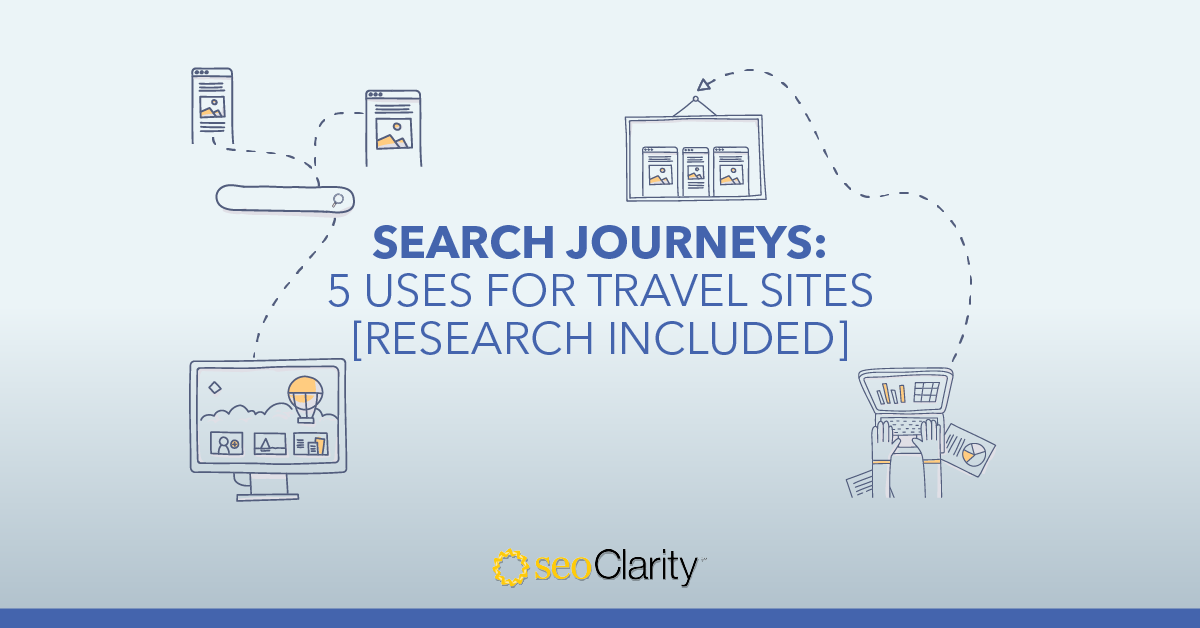In today's digital landscape, regardless of your industry, capturing and maintaining the attention of your audience isn’t easy.
In the midst of content chaos, standing out requires a deep understanding of your users’ search journeys. These insights empower you to anticipate your customers' needs, craft compelling content, and establish your brand as an authoritative source.
Below, we'll dive into how comprehending the user's search journey helps digital marketers create value, cater to the needs of their target audience, and improve engagement.
Table of Contents:
User Search Journey Definition
Before we discuss the ways SEOs can use Search Journeys to enhance their digital marketing strategies, let’s define what they are.
A user search journey encompasses the different steps a searcher takes when seeking out information about a specific topic through a search engine like Google.
The search journey begins with the initial search a person makes and is followed by all of the additional searches they input until they have found all of the necessary information they need.
For example, the page below has been optimized for the entire user search journey. Although the page ranks for “used cars for sale,” it also includes information that predicts what the user would likely look for next such as “used-car loan rates” and “tips when buying a car.” In addition, it also addresses questions the user might ask prior to purchasing a used car such as “knowing if certified pre-owned is for you.”
By anticipating users' past, present, and future needs, the page is equipped to meet the user in whichever stage of their search journey they are currently in.
The Origin of User Search Journeys
In 2018, Google released an algorithm update that introduced the concept of Search Journeys.
They recognized that user intent varies greatly depending on their stage in the search journey, and as users acquire more knowledge about a subject, their search behavior and intentions evolve.
Instead of merely answering queries, Search Journeys utilizes AI technology to delve into users' past searches and predict their future ones. Doing so presents users with content tailored to their current position in their search journey.
How to Get Insight Into the Entire User Search Journey Using seoClarity
Google uses advanced AI technology to determine Search Journeys. Until recently, this information wasn’t available anywhere else.
Now, Topic Explorer has been enhanced with Sia (seoClarity’s AI Assistant) to reveal the full user search journey for your target keywords.
To predict what users will search for prior to and following your target search term, Search Journeys in Topic Explorer utilizes clickstream datasets and generative AI. All you have to do is type in your topic and click “explore with Sia” next to the search bar.
5 Use Cases of the Full User Search Journey for SEO
SEOs stand to gain substantial advantages by understanding the entire user search journey. Below, we will address five of the most impactful use cases of user search journeys for SEO.
1. Increasing Engagement and Predicting Audience Needs
Understanding the full user search journey provides insight into the future needs of your target audience. In doing so, you have the ability to proactively create relevant content that your audience doesn’t even know they want yet.
Catering your website to the future needs of your audience rather than just answering their initial query helps keep them engaged on your website for longer.
Plus, it also improves their user experience as users won’t have to input multiple searches and comb through multiple sources to find all the information they need. This elevated user experience and prolonged engagement ultimately increases the likelihood of a conversion.
The examples below demonstrate how Search Journeys helps predict user needs to maintain their engagement. For example, after typing in a search for “summer footwear,” a user might decide that they want to purchase a pair of strappy sandals and then fine-tune their search to “strappy sandals for beach” or “strappy sandals with heels.”
If these search queries don't align with your website, simply provide your email, and we'll generate a tailored Search Journey to suit your specific requirements.
2. Showcasing Topical Expertise and Authority
Knowing the full search path a user will likely take also helps establish topical expertise and authority.
By analyzing the searches a user likely makes pre and post landing on a particular topic, content creators can identify gaps in their content and in their knowledge about their target topic.
To increase the authority of their website for their target keywords, SEOs should consider covering any unaddressed topics that are revealed through Search Journeys.
These examples demonstrate additional topics to cover in addition to your target search term to increase your credibility authority regarding that topic.
Want examples that better align with your site? Share your email and we'll curate a personalized Search Journey for you.
3. Improving the Architecture of Your Website
Having insight into the patterns of user searches also helps SEOs organize site maps and create the most logical site architecture possible.
By basing site categories and sections on the funnel progression of the stages in the searcher’s journey, site users will have an easier time navigating the website.
Below, we’ve included three Search Journeys for high-level queries that reveal a logical site structure that aligns with the typical path users take in their quest for information. For example, a site may have a page on “outdoor cooking supplies,” leading to a product page on “charcoal grills” which then leads to a page on “charcoal grill accessories.”
For a free customized Search Journey example, simply provide your email and target search term and we'll send you a custom sample within 24 hours.
4. Developing Content Strategies for Local SEO
Popular searches such as "Family Doctors in Chicago" reveal the impact that local and regional content strategies can have on your website’s SEO.
Search Journeys makes it easy to identify opportunities for location-specific topics related to your target keywords.
The following examples reveal how Search Journeys helps guide local content strategies for the search terms referencing specific locations.
Want a free Search Journey for your target keyword? Simply fill out the form below and we'll send a custom Search Journey your way.
5. Creating High-level Content Strategies
In addition to local content strategies, Search Journeys also helps SEOs create macro-level content strategies.
Analyzing higher-level searches such as “mulch” using Search Journeys provides insight into overarching topics and the associated information users look for before and after initiating their search.
Interested in exploring other Search Journeys? Share your email and target keyword, and we'll provide a custom Search Journey just for you.
Conclusion
Harnessing the insights into user search behavior offered by Search Journeys in Topic Explorer empowers SEOs to craft strategic content, bridge content gaps, bolster site authority, and enhance user experiences.
Employing a data-driven content strategy, SEOs can not only anticipate user needs but also cater to them at every stage of their journey, thereby amplifying engagement and driving conversions.
Want to learn more about Search Journeys and how it can elevate your keyword research strategy? Schedule a demo and get a custom 5-day free trial today!








Comments
Currently, there are no comments. Be the first to post one!